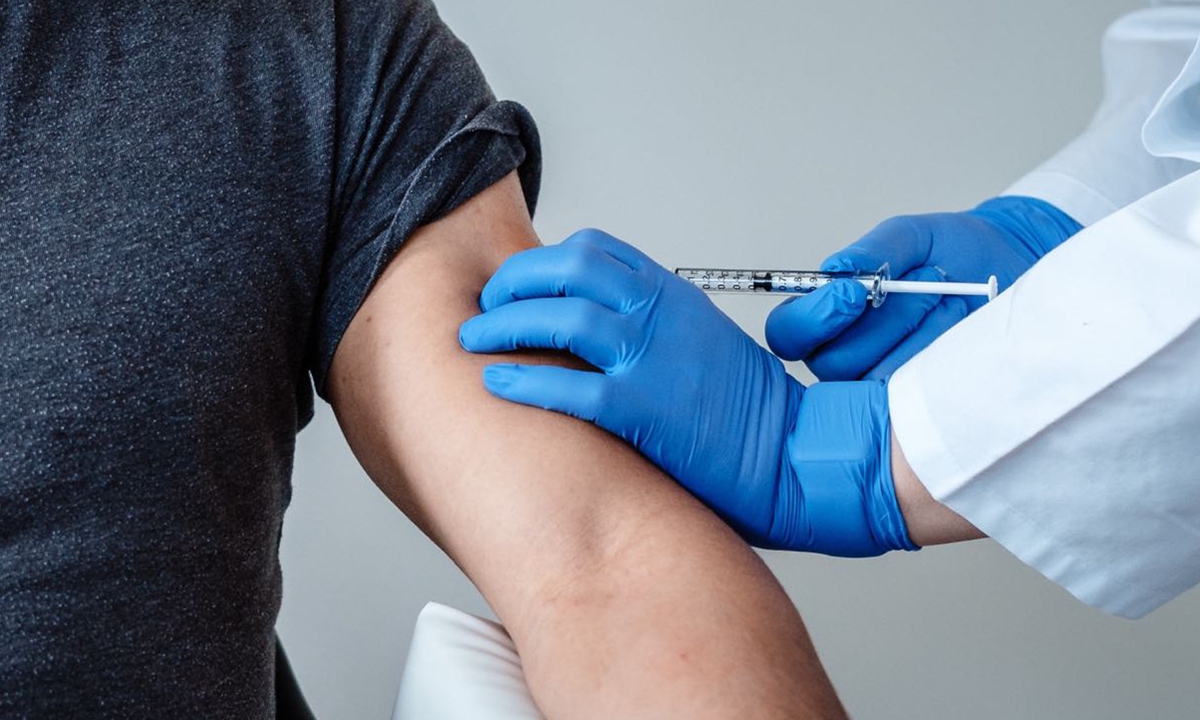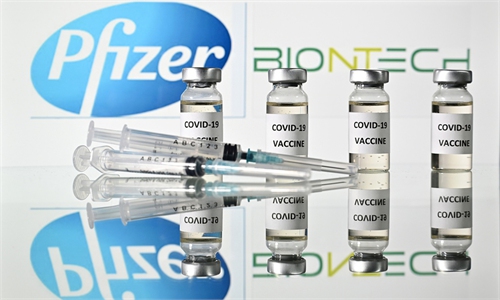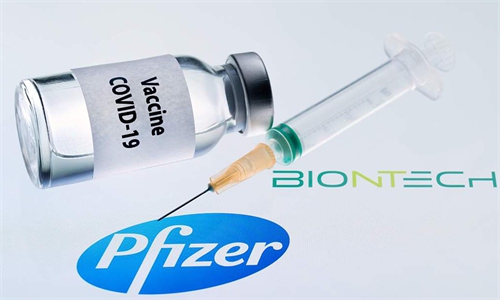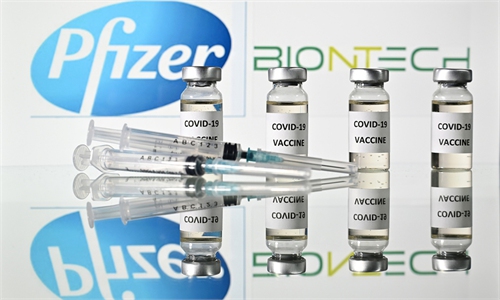
A dose of COVID19 vaccine BNT162b2 is given to a man. Photo: Courtesy of BioNTech
Despite the US government's attempt to get rid of the Chinese supply chain, Chinese syringe and needle suppliers are dealing with a production expansion after orders continue to increase worldwide, with the US setting the trend. Several large producers have seen their orders pile up for months as the Biden administration ramps up its efforts for COVID-19 vaccinations.
This comes as a US official admitted in a rare move in a recent Congressional hearing that 80 percent of the needles and syringes in use in the US originated from China.
The figure was confirmed by Stacy A. Cummings, performing the duties of undersecretary of defense for acquisition and sustainment, in a Senate Armed Services Committee hearing on Thursday after the number was brought up by a senator at the meeting.
Several business representatives that the Global Times reached on Sunday said that the figure is within expectations, with orders from the US remaining strong since last year when the country unveiled plans for public vaccinations.
To reduce dependence on China, Biden signed an executive order aimed at boosting manufacturing jobs by strengthening the US supply chain for advanced batteries, pharmaceuticals, key minerals and semiconductors, the Associated Press reported on Wednesday.
Cummings also noted that the US could and should increase production domestically in the future.
However, industry insiders believe that the US' attempt to get rid of China by producing syringes and needles on its own will be costly and unrealistic.
Chinese-made syringes and needles, which are polymer disposables for medical use, take up to 90 percent of the global market, and the daily domestic production capacity of the 1-milliliter syringe alone - the most-used standard for the COVID-19 vaccines worldwide - can be up to hundreds of thousands of units, Cai Tianzhi, deputy secretary-general of China Chamber of Commerce for Import and Export of Medicines and Health Products, told the Global Times on Sunday.
Low production and labor costs and a complete domestic supply chain enable Chinese companies to gain top share in the global market, and the situation has been further boosted by explosive demand for vaccinations, said Cai.
"Orders have been piling up for several months, and we are expanding our production to meet the rising demand. With the new production lines to be completed in early May, our monthly capacity will be quadrupled to 40 million units," an executive director with a large listed company that supplies syringes and needles told the Global Times on Sunday on condition of anonymity.
The source said that up to 50 percent of its products go to the US via middlemen, including those that are not used for the US but exported to third countries along with Pfizer's vaccines.
Jiangxi Sanxin Medtec Co, another large syringe producer and an FDA certificate, is also working at full swing to deal with strong orders from home and abroad.
"Our factory operated even during the Chinese Spring Festival holiday and currently the syringe orders from overseas are more than those from the domestic market," the company told the Global Times in a statement over the weekend.
Shanghai Kindly Enterprise Development Group (KDL), a major syringe and needle supplier, has seen its order backlog stretch until August amid rising purchases from abroad, mostly from the US and UK, which take about 80 percent of the company's total exports, the company told the Global Times in late January.
The company started receiving orders from the US over half a year ago, but as production capacity has reached its limits, the products being made now for the US market were ordered half a year ago, according to KDL.
The pressing demand has driven up the prices of raw materials including plastics and steel, which are ultimately reflected in the market prices of syringes.
Currently, the price of a syringe has increased from 0.1 yuan ($0.015) per unit to 0.3 yuan, while those for the US are even higher at 0.5-0.8 yuan, increasing by 800 percent, because the suppliers with FDA markings are very limited, an industry insider told the Global Times on Sunday.
Despite the rocketing prices, the cost for a syringe that is made in China is still lower than one in the US, as in addition to the low labor cost and adequate supply chain, mass production has reduced the costs, the Global Times learned.



